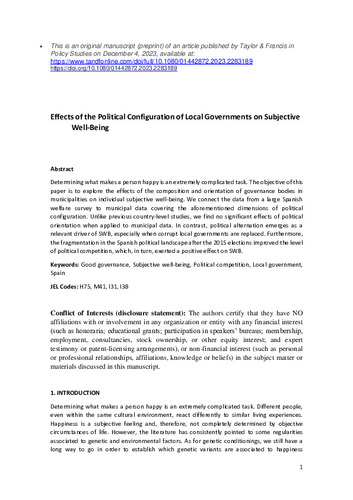Effects of the Political Configuration of Local Governments on Subjective Well-Being
Autor(es) y otros:
Palabra(s) clave:
QoL, Well-being, Local Governments, Spain, Governance
Political configuration
Political competition
Fecha de publicación:
Editorial:
Taylor&Francis
Versión del editor:
Citación:
Descripción física:
Resumen:
Determining what makes a person happy is an extremely complicated task. The objective of this paper is to explore the effects of the composition and orientation of governance bodies in municipalities on individual subjective well-being. We connect the data from a large Spanish welfare survey to municipal data covering the aforementioned dimensions of political configuration. Unlike previous country-level studies, we find no significant effects of political orientation when applied to municipal data. In contrast, political alternation emerges as a relevant driver of SWB, especially when corrupt local governments are replaced. Furthermore, the fragmentation in the Spanish political landscape after the 2015 elections improved the level of political competition, which, in turn, exerted a positive effect on SWB.
Determining what makes a person happy is an extremely complicated task. The objective of this paper is to explore the effects of the composition and orientation of governance bodies in municipalities on individual subjective well-being. We connect the data from a large Spanish welfare survey to municipal data covering the aforementioned dimensions of political configuration. Unlike previous country-level studies, we find no significant effects of political orientation when applied to municipal data. In contrast, political alternation emerges as a relevant driver of SWB, especially when corrupt local governments are replaced. Furthermore, the fragmentation in the Spanish political landscape after the 2015 elections improved the level of political competition, which, in turn, exerted a positive effect on SWB.
ISSN:
Colecciones
- Artículos [37543]
- Contabilidad [80]
Ficheros en el ítem





